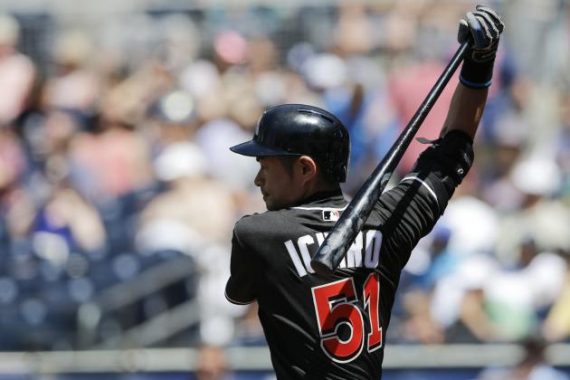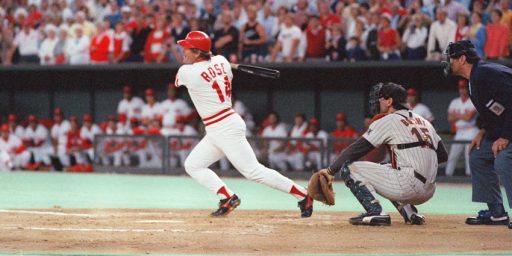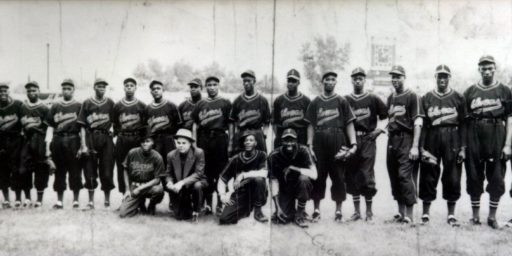Ichiro Suzuki ‘Passes’ Pete Rose Hit Total
The most underrated superstar of this era has passed a special milestone, albeit with a big asterisk.
Ichiro Suzuki got his 4,257th “major league” hit last night, surpassing the career Major League total of Pete Rose. Alas, the first 1,278 of them came in Japan.
Rose was his usual gracious self in anticipation of the milestone:
“It sounds like in Japan,” Rose told USA TODAY Sports, “they’re trying to make me the Hit Queen. I’m not trying to take anything away from Ichiro, he’s had a Hall of Fame career, but the next thing you know, they’ll be counting his high-school hits.
“I don’t think you’re going to find anybody with credibility say that Japanese baseball is equivalent to major-league baseball. There are too many guys that fail here, and then become household names there, like Tuffy Rhodes. How can he not do anything here, and hit (a record-tying) 55 home runs (in 2001) over there?
“It has something to do with the caliber of personnel.”
Alas, Rose is mostly right. The Nippon Baseball League is widely considered a AAAA league—somewhere above the highest of the US minor leagues but below Major League Baseball. One can’t mix statistics from the two leagues for purposes of records.
That doesn’t mean that Ichiro’s performance has been anything less than astounding.
ESPN’s Jim Caple:
Ichiro’s MLB career slugging percentage is .405. Rose’s wasn’t much higher — just .409 — and their home run per at-bat rates are roughly the same: 1.1 percent for Ichiro and 1.0 percent for Rose. Ichiro has 37 leadoff homers in his career, among the top 10. He also hit a walk-off home run against Mariano Rivera in 2009.
Rose reached the 3,000-hit mark in his 16th big league season. With 22 more hits, Ichiro will also reach 3,000 hits in his 16th season. If he reaches that mark, he will have done so despite being nearly four years older in his big league debut than anyone else in the 3,000-hit club. The majority of the club’s members began their big league careers by age 20 or 21.
In addition to leading Japan’s Pacific League in batting seven times, Ichiro led the American League twice (2001 and 2004), while Rose led the National League in batting three times (1968, 1969 and 1973). Ichiro hit .372 in 2004, 24 points higher than Rose’s highest average (.348). His major league career average is .314, compared to Rose’s .302. Throw in his NPB numbers, and Ichiro’s career average is .323.
By the way, is the NPB league truly a lower level than our majors? Probably, but consider this: Ichiro averaged 1.3 hits per game in his seven full seasons in Japan. He averaged 1.41 hits per game his first 10 seasons in MLB, before he turned 37. Rose never averaged more than 1.3 hits per game in any 10-year stretch. Also, Ichiro is playing in an era in which pitchers are throwing a good 10 mph faster than they did in Rose’s time. But Rose hit .335 in 1968, the famed Year of the Pitcher.
When you go to non-hit comparisons, Rose, famous for his head-first dives, stole 198 bases in his career — and was caught stealing 149 times. The speedier Ichiro has stolen 504 bases, most among active players. Rose barreled into Ray Fosse to score the winning run in the 1970 All-Star Game, one of the most famous in All-Star history. Although not nearly as well-remembered, Ichiro had an important race to the plate when he hit the only inside-the-park home run in All-Star Game history in 2007.
Add Rose’s minor league numbers (all at Class A or lower) and his postseasons, and he had 4,769 hits as a professional player, the most in history. Ty Cobb is second with 4,379, and Ichiro is third with 4,256. But throw in Ichiro’s minor league numbers from Japan, and he has 4,434 hits, which puts him second.
That’s still significantly behind Rose, but bear in mind that when Ichiro played his first three seasons in Japan, the NPB season was only 130 games, and it was just 135 games his final four years (though he missed 62 games due to injuries his final two years). Despite those injuries, if it had been a 162-game season like in MLB and he had maintained his 1.34 hit per game average, Ichiro likely would have had at least 125 more hits in Japan, which would bring his professional total to over 4,575. That still wouldn’t match Rose’s total, but Ichiro’s career isn’t over yet.
Now, some of those arguments actually cut against Ichiro. In particular, spending his first six years in Japan means that he hit MLB is the prime of his career, whereas Rose and most others’ career averages are brought down by struggles in their late teens and early 20s. But the much shorter seasons in Japan are a strong point: Ichiro would likely have at least as many hits as Rose had he started here given so many more at-bats. Alas, we’ll never know and can’t simply crown Ichiro the “hit king” by virtue of adding apples and oranges.
Regardless, there’s not much doubt that Ichiro is the better overall baseball player. And none whatsoever that he’s a better sport.






Excellent conclusion, Dr. Joyner!
Japanese professional baseball uses smaller baseballs, has a smaller playing field, and has a smaller strike zone than American baseball. The regular season is shorter than MLB’s season by just under 20 games, and games are generally limited to 12 innings even if the game is still tied at that point. Additionally, as you point out, the quality of play is such that the Nippon League is simply not comparable to MLB. Characterizing it as AAAA baseball, meaning it’s somewhere between MLB level of play and AAA minor league here in the U.S. is actually a pretty good description of the comparisons between the two leagues.
The point is that Japanese professional baseball is in significant ways a different game than playing in the MLB, which is one reason not every “great” Japanese player succeeds here in the U.S. It would be as inappropriate to company statistics from the two leagues as it would be to combine an American players Minor League and Major League statistics.
Ichiro is a great player who will no doubt be among the few to be inducted into the Hall of Fame for both the MLB and Nippon Professional Baseball. When he’s inducted into Cooperstown,it would be entirely appropriate to make note of his accomplishments in Japan along with those here. But, no,we can’t combine the two and argue that he has passed Pete Rose in hits.
Rose may be a jerk, but he did accomplish something great and he’ll get his due in Cooperstown someday, probably after he’s dead at this rate. Someday, someone may surpass him. But Ichiro can’t be counted as being that person.
How about a compromise? If we recognize Ichiro as the professional baseball hits leader, we could also recognize Oh as the professional baseball home run leader, taking that title away from Barry Bonds. That is a trade I think many fans would make.
Statistics need to keep things simple. To go back to the 1961 controversy, if the record is “a season” than the “season record-holder” is the one with most runs in a season. If you want to protect Ruth, then just break it out and say “154-game season record-holder” and “162-game record holder”, alongside the “full season record-holder”. If you whine about this, then consider the absurdity of putting all records in jeopardy by saying things were different: “There were fewer night games then!”, “People had to travel by train!”, “They were worried about communism!”. Just call it a season. Mr. Ichiro has a number of hits in the US Major Leagues. It has not bested Mr. Rose.
I do not think they should combine totals from American and Japanese baseball – as Doug said above, they are 2 very similar yet in many, many ways, different games. Also, what will we do if and when some day players from some Latin American countries (Venezuela, the Dominican, Mexico etc) have combined stats that break an older venerated American MLB record?
On his MLB stats alone Ichiro will be elected to the Hall of Fame on his first ballot. Let the HOF plaque describe his MLB and Japanese accomplishments. A great player, deserves all the acclaim he gets.
@Doug Mataconis: Given all of your excellent points, I don’t see how you can agree that Japan’s league is better than AAA. Just about any AAA player is capable of playing in the Major Leagues(*), something that cannot be said about the Nippon Baseball league. What can be said about the Nippon league is very few are capable of playing in the Major Leagues, and some portion of these are old farts that are washed-up in the major league.
I also think that advanced stats don’t look as favorably on Sukuk’s talent for hitting singles (as true for Rose), and while I don’t think a lot of voters right now are sabermetricaly inclined, Suzuki might want to consider wrapping things up. There are the intangibles of course: ambassador of baseball, makes the transition to a major league baseball, and gets a late start at age 27. I would bet he makes the HOF, but objectively the case is close.
(*) Some AAA players are being intentionally prevented from advancing in order for teams to retain control over the player during their best years.
This is a sabermetrically-inclined assessment of Ichiro:
Most voters are not going to look at it this way, they will pick and choose traditional stats like Jim Caple.
@PD Shaw: If only hitting were the only thing in baseball, you’d be right. But you might want to count the steals, base running, and more importantly the many Gold Gloves that Ichiro has.
@PD Shaw:
Sorry, no. This is not even close to being true.
[Insert rude noise here.]
You’re missing the elephant in the room, which is that Rose set his record by penciling himself into the lineup every day long after he was no longer a major-league caliber player. His last few years were immensely embarrassing outside of Cincinnati, and delayed the careers of legitimate stars like Eric Davis, Kal Daniels, and Paul O’Neill. It was clear to everyone that he was deliberately hurting the team’s chances of winning in order to set the record.
As a former Seatlleite, I enjoyed Ichiro playing for the Mariners.
But, I want to mention something off-topic…The balance of this blog’s news items is decidedly anti-Trump and while I make no brief for or against Trump, I wonder if OTB will scrutinize Hillary as closely as Republicans are watched. Anyone care to talk about the nations that have donated to the Clinton Foundation and have national policies to kill gays? Anyone see any hypocrisy? Hillary’s Emailgate is real but blithely ignored here and could possibly trigger a Constitutional crisis. Anyone care?
There’s more but OTB has blinders on.
@Franklin: The article I linked to addresses the full-package argument by looking at WAR (wins above replacement level), which includes fielding and base-running.
None of this is meant to argue that he’s not a good player, but his advanced stats are going to be significantly lower than a lot of people that had or have no chance in the hall of fame.
Other points. Ichiro is a modest guy who could care less about this obviously lame argument and just wants to join the 3,000 hit club. He knows who the greatest hitter was and who holds that record, its not of his concern nor would he argue anything putting him in that company. That said the dude is 42 years old and currently batting .349. Rose’s Reds teams of the 70’s were monsters, no pitching around him – Ichiro played for the Mariners who were pretty much sub-par his entire tenure there. Had he came to the MLB and never played in Japan for 7 or so years, I would argue he would have given Pete Rose a run for his money.
@john430:
You owe me a new keyboard.
Clearly you missed the period last year (or was it earlier this year?) when Doug was taking justified flak from the commenters for posting some new “Hillary is icky” article every single day. Email servers featured prominently.
Trump is an unstable, unqualified, ignorant, thin-skinned, bigoted buffoon with no impulse control — who has nevertheless somehow managed to become the GOP’s presumptive nominee for President. This story would dominate any news cycle anywhere, ever. Hillary Clinton on her worst day is less dangerous and more competent than Donald Trump on his best. This is obvious to (apparently) ~70% of America. Diagnosing and treating the other 30% is our number one national priority.
@DrDaveT: Well how about this then, in AAA a player will face a nine-player line-up capable of playing in the MLB. I should concede that there are teams with poor farm systems, but there are a lot of good farm teams, and a lot of good players held back from playing in the majors in order to maximize the years of team-control before free-agency or as part of a strategy of losing, building up talent through high draft picks and surging for a window of competitiveness. There are also a lot of good players blocked by better players, and major league players sent down to learn a new position or secondary pitch.
This situation has probably gotten worse since Suzuki starting playing in the majors, so the comparison may not be completely appropriate. But I see a lot of minor league players getting screwed these days, and I don’t expect the situation to change so long as the players union only represents those in the majors.
@Jc:
That’s pretty sophisticated. Choosing among Babe Ruth, Ted Williams, Ty Cobb, and Barry Bonds requires pretty advanced tools.
@DrDaveT: True – ok, he knows who the guy is with the most MLB hits
@PD Shaw:
Actually, many MLB teams that are doing very poorly, have on their roster players who are properly AAA, and probably should not be much more than role players on the parent team.
Also, many MLB teams have their best prospects in Double-A ball. AAA has a lot players who are in a last chance mode – many years in minor league ball, low probability of a call up.
@PD Shaw: I should have looked at your link. Still, there are more than 124 position players currently in the HOF, although I didn’t realize until just now that there’s not *that* many more.
I’ll concede he’s not the greatest player of all time (not that I would have ever claimed that), but predict he’ll be first ballot anyway. It’s just so subjective, and he’s got all the subjectives going for him, so to speak.
Ichiro’s hits in Japan are good for bragging rights but can’t count toward any meaningful record.
On the other hand, Rose should be docked the hits he racked up in the last 2-3 years of his career, when his body and his skills had eroded to the point where he was hurting his teams on the field but still penciling himself in as a player-manager for the purpose of breaking Cobb’s record.
@PD Shaw:
I think you’re overstating the problem. Many teams will leave a future valuable player in the minors for an extra 6 months or year, in order to delay the arbitration clock. Nobody is going to delay for longer than that because nobody in the high minors is more than 3 or 4 years away from their likely peak value, and MLB teams own you for 6.
Most players in AAA will never be good enough to be bench players in MLB, or will only be that good for a year or 2 near their peaks.